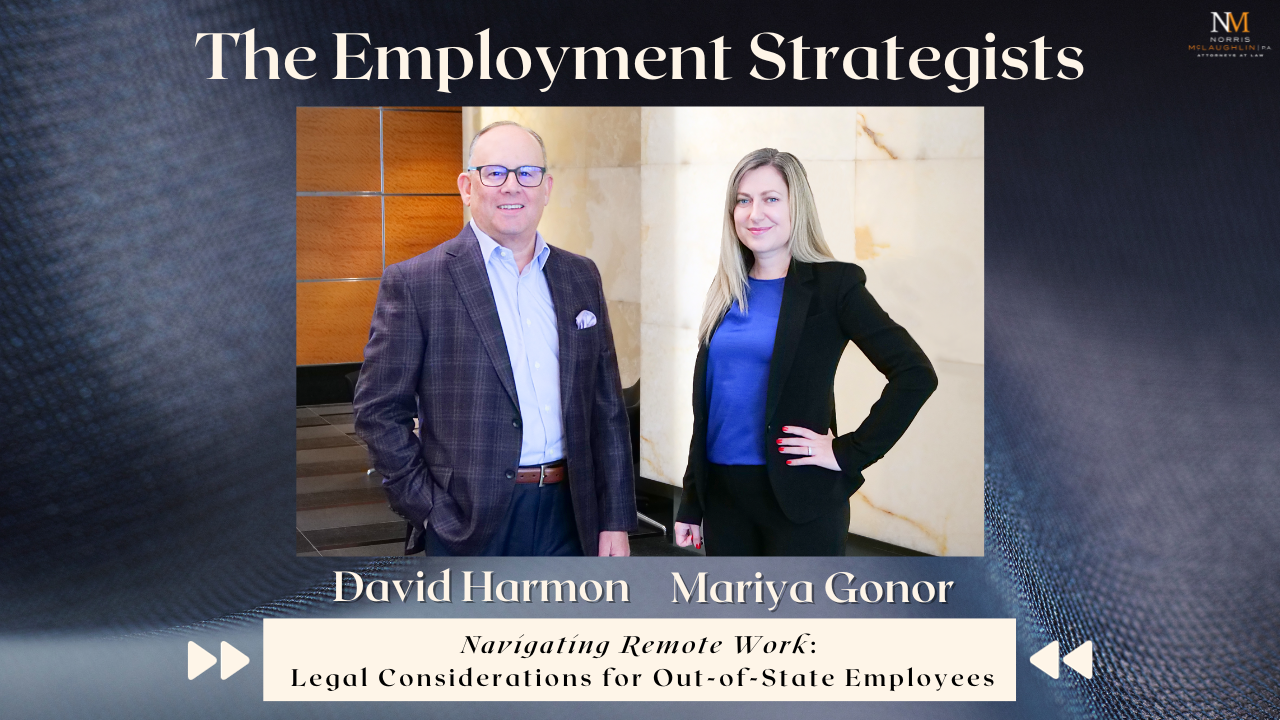Navigating Remote Work: Legal Considerations for Out-of-State Employees

In the wake of the pandemic, it's undeniable that the landscape of employment has undergone a significant transformation. Employers continue to grapple with post-COVID-related challenges. The shift towards remote work has been especially pronounced, prompting both employees and employers to adapt to new realities. Amid these changes, one question prevails: How should employers address the evolving work environment?
Embracing Remote Work
The pandemic accelerated the adoption of remote work, causing organizations to pivot swiftly. A growing number of employees now demand remote work accommodations, as many relocate across state lines. As a result, employers face a host of challenges, particularly concerning compliance with state-specific regulations. One of the questions we are asked most frequently is whether an employer must comply with all state-specific statutes of where their employees are located. The answer is unequivocal—with very few exceptions, employers must comply with the laws of the states where their remote employees are situated. Notably, this holds true even for companies based in New York and New Jersey, where employee protection laws are particularly stringent; their non-retaliation and anti-discrimination laws are among the most robust and employee-friendly in the nation. In a notable case, the New Jersey Supreme Court ruled that an employee who had never set foot in the state but worked for a New Jersey employer was entitled to the protection of the state's anti-discrimination statutes. This drives home the need to comply with these laws.
Multistate Complexity
Even for employers located in New Jersey and New York, there's a need to be cognizant of other states' legal frameworks, whether employers are hiring from those other states or have New Jersey or New York-based employees residing there. To shed light on some of the complexities, below is a non-exhaustive list of issues for employers to consider when hiring remote employees:
- Background Checks: In addition to federal regulations, many states have introduced their own background check provisions, each with distinct requirements.
- Criminal History Inquiries: States often have varying regulations regarding when and how employers can inquire about an applicant's criminal history. This necessitates a careful approach to avoid legal pitfalls.
- Disclosure Requirements: Certain states mandate specific considerations and disclosures during the hiring process, requiring employers to provide comprehensive information to prospective employees.
- Employment Statutes: Employers should be mindful of their state-specific obligations to pay for overtime (and track time worked), provide accrued sick leave and parental leave; and be aware of applicable whistleblower/discrimination statutes.
- Tax-related Inquiries and Withholding: Certain states (and even cities) mandate specific employment tax withholdings for workers. In addition, although it is beyond the scope of this article, employers should consider the tax implications of having a minimum number of employees to create a sufficient nexus with the state to subject the employer to income taxes there.
- AI usage considerations: Some states and cities have already adopted legislation targeting ChatGPT and other generative AI tools in connection with employment inquiries. For instance, New York City has passed a law requiring a bias audit when employers use AI software for employment decisions; Alabama, Colorado, Illinois, and Mississippi have legislation that limits the use of AI; and many other states are currently considering legislation.
- Monitoring of Remote Workers: Many companies utilize technology to monitor their employees through various means, including on-camera requirements or tracking keystrokes. Employers must be mindful of the prohibition imposed by various privacy acts and data collection acts, such as California’s Privacy Rights Act and Illinois’ Genetic Information Privacy Act.
This list is by no means exhaustive, but reflects starting points to consider in order to avoid potential missteps that could prove costly for employers.
Strategies
Understanding the nuances of state-specific regulations, seeking legal counsel, and remaining informed are crucial steps to ensure compliance and maintain a productive workforce in this new era of remote employment. In addition, employers might want to reinforce their equal employment opportunity and anti-harassment policies and revamp them to fit the remote-work environment.
For inquiries or further information about remote workspaces and cross-state compliance, please don't hesitate to contact David Harmon and Mariya Gonor at TheEmploymentStrategists@norris-law.com.
Our team is here to assist you.




